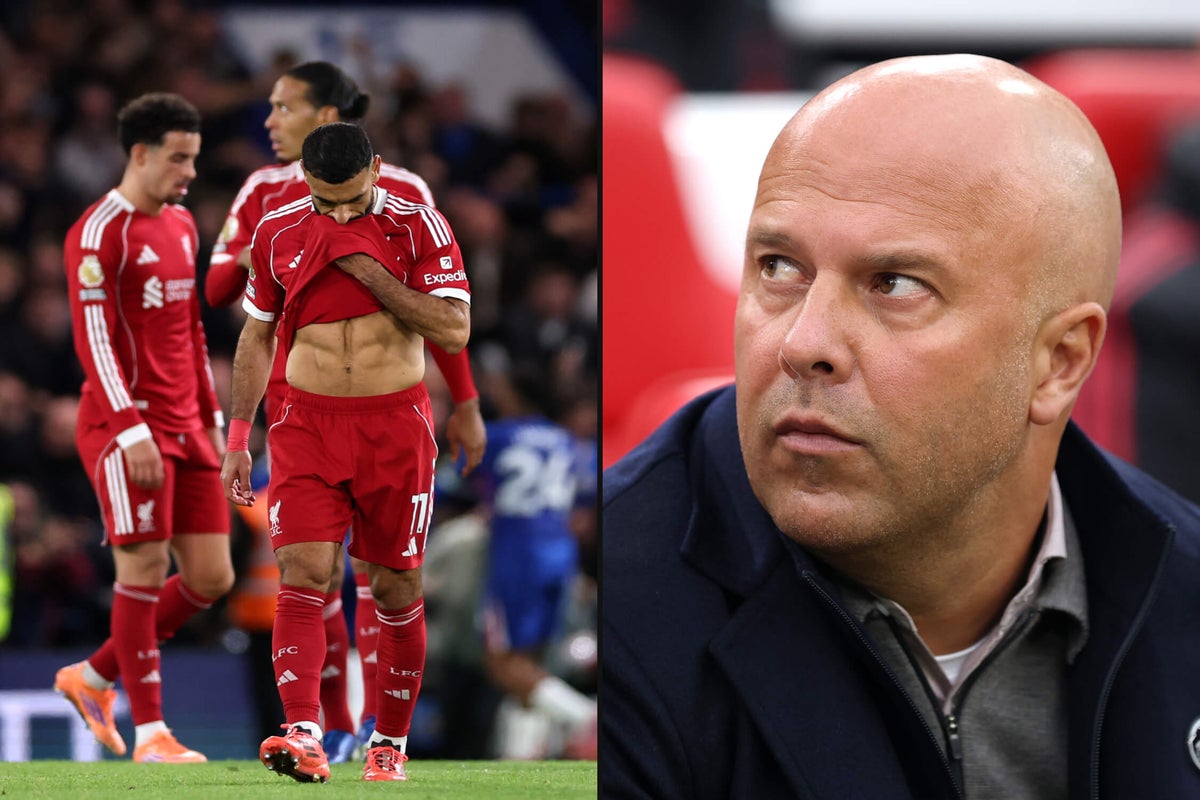Liverpool eased their Champions League jitters by thrashing Eintracht Frankfurt on Wednesday; now for the Premier League.
With leaves still clinging to the trees, Arne Slot had overseen four straight defeats, prompting searching questions to be asked of the head coach, the club’s summer transfer strategy, senior players and everything in between.
Liverpool head to Brentford tomorrow, eager to prove that Wednesday’s return to form was not temporary, so what could they learn from their recent setbacks to ensure momentum is maintained?
We asked reporters who cover Crystal Palace, Galatasaray, Chelsea and Manchester United to share their insights into how their teams won, and what lessons Liverpool could take.
Crystal Palace (away), Premier League, September 27: Lost 2-1
This defeat was more due to Palace’s own high standards than their opponents’ failings, although one obvious area ultimately undid the champions: their frailty from set pieces.
Palace’s first goal came from a corner — albeit a disputed one, given the final touch seemed to come off Tyrick Mitchell — as a back-post ball towards Marc Guehi forced a mistake from Ryan Gravenberch, whose misplaced header fell perfectly for Ismaila Sarr to score. The last-gasp winner came from Liverpool’s failure to clear effectively from a long throw and Jeremie Frimpong’s decision to rush out (circled below) rather than stay with Eddie Nketiah, who used the space left behind to fire home.
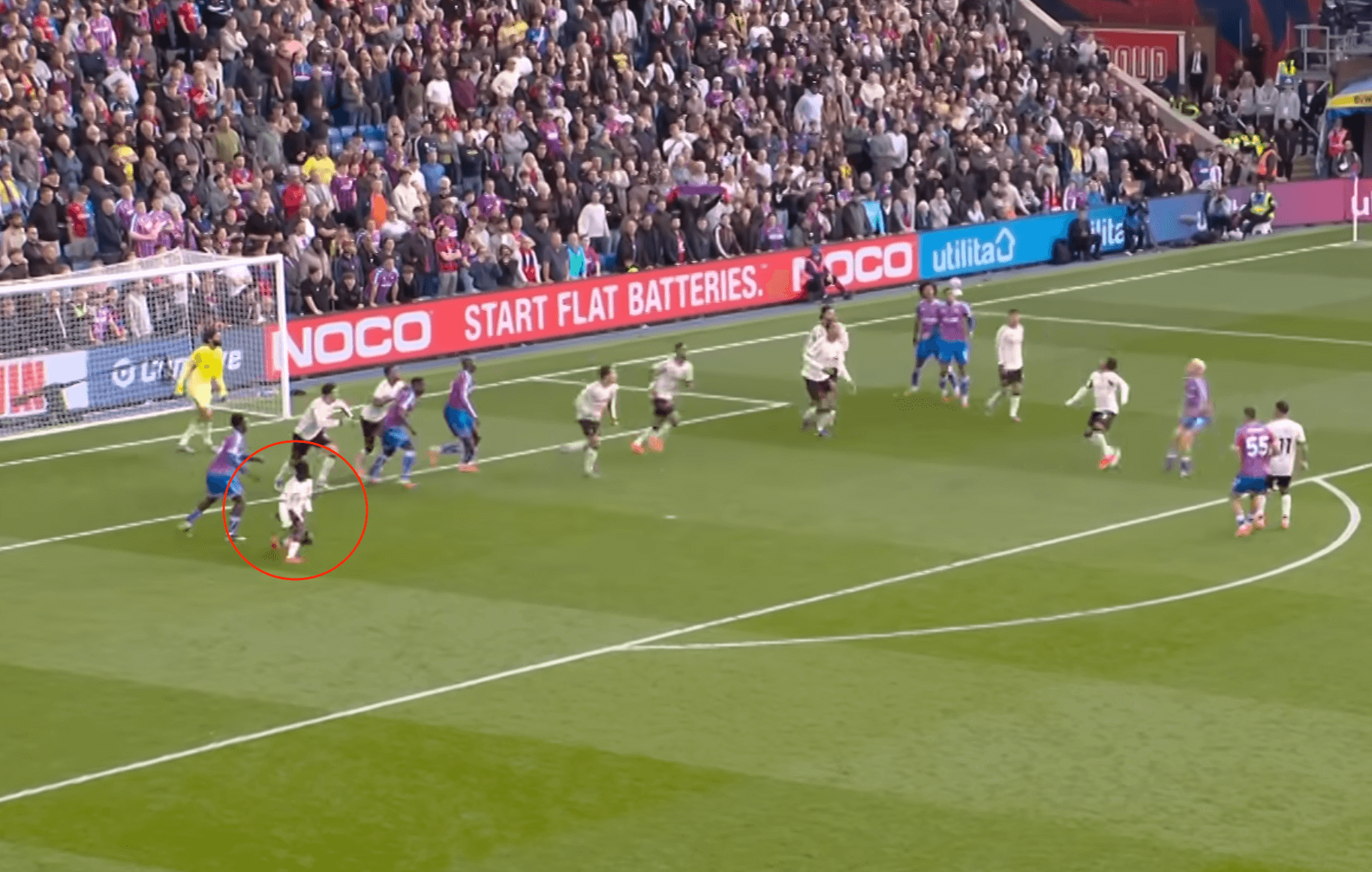
Jeremie Frimpong (circled) loses Eddie Nketiah at Selhurst Park (Sky Sports)
They were poor errors but the most consistent weak link, the one Palace appeared to target most consistently, was Ibrahima Konate. He struggled badly when confronted by Palace’s rampant attack, particularly Jean-Philippe Mateta, who bullied him from the start. Konate earned a yellow card for one rash tackle and could not deal with Mateta’s physicality. It meant Palace created seven big chances in that first half alone.
It helped that it was the first time manager Oliver Glasner had his strongest side available in the Premier League this season, with Palace looking like a team flooded with confidence after what was then a 17-game unbeaten run across all competitions.
They also had good memories of hurting this Liverpool team: they had drawn 1-1 at Anfield on the final day last season (a game Palace really should have won) and beat Arne Slot’s side in the Community Shield on penalties after a 2-2 draw in normal time.
All those factors ultimately proved enough.
Matt Woosnam
Galatasaray (away), Champions League, September 30: Lost 1-0
You probably know that the Turkish Football Federation president, Ibrahim Haciosmanoglu, said “Liverpool is not what it used to be” when the draw was made.
We all joked about it at the time — it sounded like he didn’t even know the new Champions League format, or that Liverpool had just won the Premier League. But in the end, he was right.
Against Galatasaray, Liverpool looked nothing like their title-winning selves: fragile at the back, disconnected in midfield, and strangely predictable up front. We expected it to be the toughest game of the group, but it wasn’t. Turkish sides in general, and Galatasaray in particular, play differently at home: more intense, more physical and pushed by an atmosphere that always catches opponents off guard, even when you know about it or have heard so many stories about it.
You might expect it, but the passion still surprises you, and it always puts pressure on visiting teams. That night, Slot’s tactical reshuffle, including major changes to the full-backs, and how much Galatasaray relied on star attackers Victor Osimhen and Baris Alper disrupted Liverpool’s rhythm. Liverpool’s defence was so shaky that even the misfiring attack went unnoticed. Add to that injuries and positional changes, and cohesion was gone.
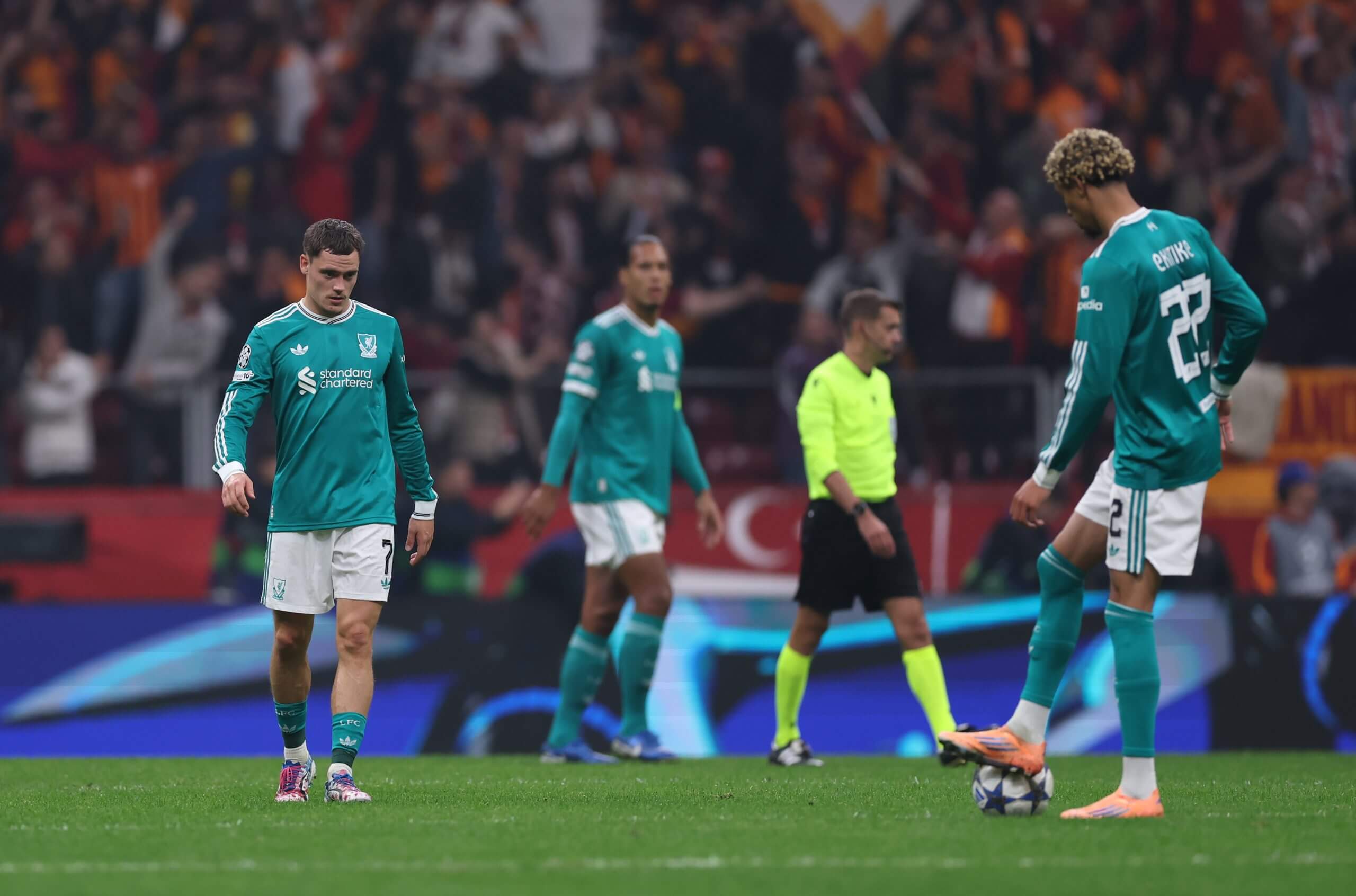
Florian Wirtz and Hugo Ekitike after Victor Osimhen’s early penalty (Justin Setterfield/Getty Images)
Still, without Osimhen’s early deciding goal, the match might have unfolded differently. From the Turkish perspective, we always highlight Galatasaray’s crowd first, then the team’s European resilience. It’s part of the club’s DNA — when Galatasaray was founded, playing (and winning) against foreign teams was written in the aims of the club and it became a matter of identity. For most Galatasaray supporters, domestic titles were never the true measure of success; Europe was.
Galatasaray managed the game brilliantly. This game was like Galatasaray’s 3-2 win against Tottenham Hotspur in the Europa League last season — they sensed Liverpool’s fragility, and went straight for it.
Banu Yelkovan, columnist for Turkish newspaper Hurriyet
Chelsea (away), Premier League, October 4: Lost 2-1
Liverpool should take Chelsea’s performance against them as a compliment because it was unquestionably their best 90-minute display of the season.
It was akin to Chelsea’s 3-0 victory over Paris Saint-Germain in the Club World Cup final, with head coach Enzo Maresca again targeting the flanks. Goalkeeper Robert Sanchez deliberately aimed deep passes to both wings.
Chelsea used four wingers against Liverpool — Alejandro Garnacho and Joao Pedro started, with Jamie Gittens and Estevao replacing them late on — and all four enjoyed themselves.
The lack of protection Mohamed Salah provided Liverpool left-back Milos Kerkez, and then substitute Andy Robertson, gave Maresca’s side a particular weakness to exploit. It was not the greatest shock that the winning goal came from Estevao scoring ahead of Robertson at the back post.
But the biggest surprise was seeing how ineffective Liverpool’s forwards were. Alexander Isak (the Premier League’s most expensive striker), substitute Hugo Ekitike (bought for an initial fee of £69million/$92m) and Salah (last season’s top scorer) registered just four shots between them.
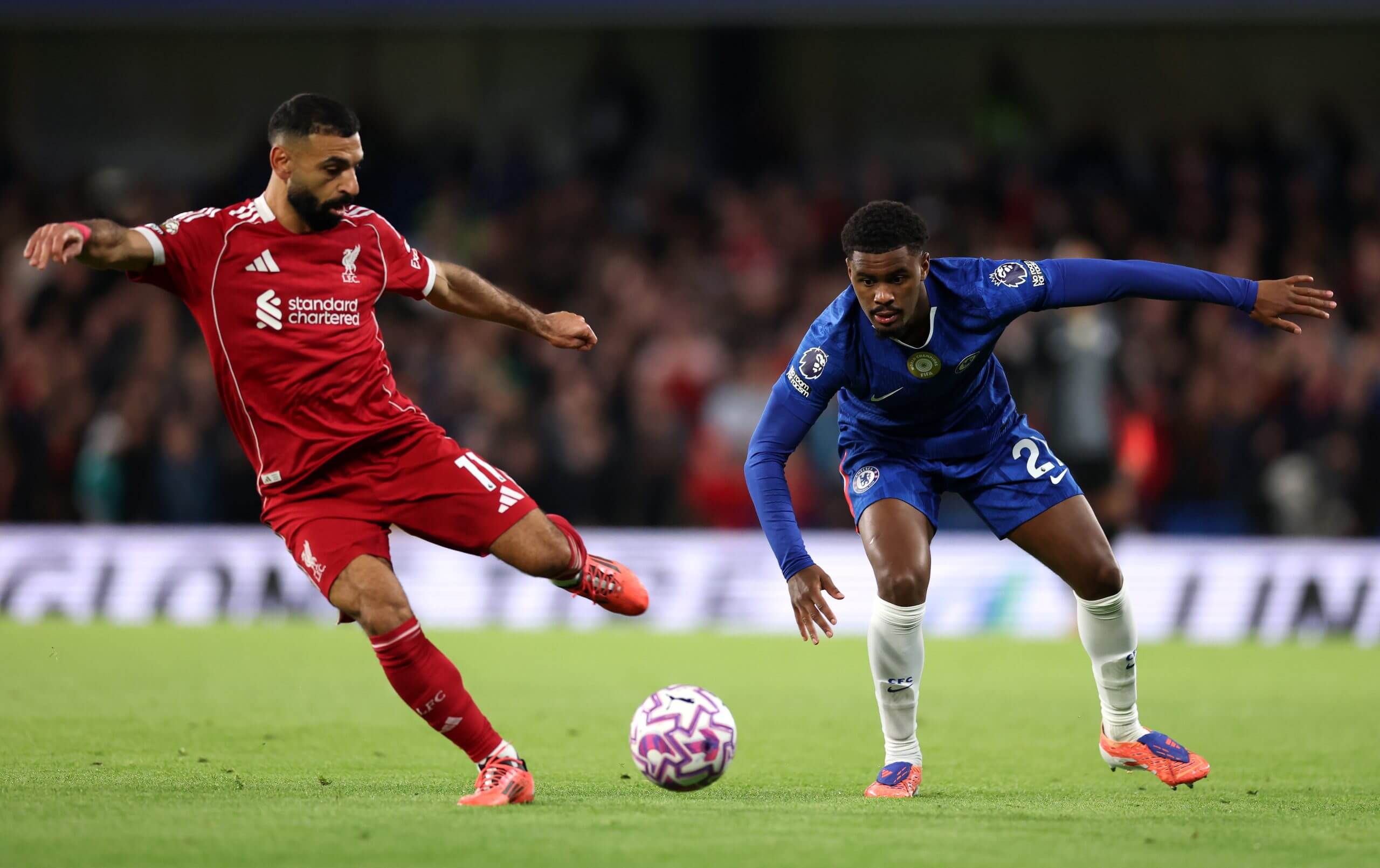
Mohamed Salah struggled against Chelsea (Michael Steele/Getty Images)
Chelsea were vulnerable. Centre-back Benoit Badiashile was starting his first league game in seven months. It was just the fourth career start for academy graduate Josh Acheampong.
Both were exemplary but had to be substituted due to injury. That left Chelsea closing the game out with right-back Reece James playing next to 19-year-old summer signing Jorrel Hato, making just his fifth appearance for the club.
The Liverpool trio were underwhelming. You could point to team-mates not getting them involved enough but the sight of Acheampong bullying Isak off the ball in the first half summed up the difference in desire.
Isak was credited with an assist for Cody Gakpo’s equaliser, but no one can say for sure he meant to flick the ball into the Netherlands international’s path.
Expect Liverpool to bounce back and go on a run, especially after that Eintracht win. But they will not retain the Premier League title if they have too many displays like the one they offered at Stamford Bridge.
Simon Johnson
Manchester United (home), Premier League, October 19: Lost 1-2
Ruben Amorim threw a wrench in Slot’s plans by playing without a recognised centre-forward for the first hour of Manchester United’s 2-1 win. Instead, Mason Mount, Matheus Cunha and Bryan Mbeumo formed a fluid front three that caused a tactical headache.
Mbeumo would drift wide to duel with Virgil van Dijk or Kerkez after long passes from goalkeeper Senne Lammens, who kicked long 45 times on Sunday. Cunha would drop into deeper positions, looking to trap any second balls won, before moving into vacated space.
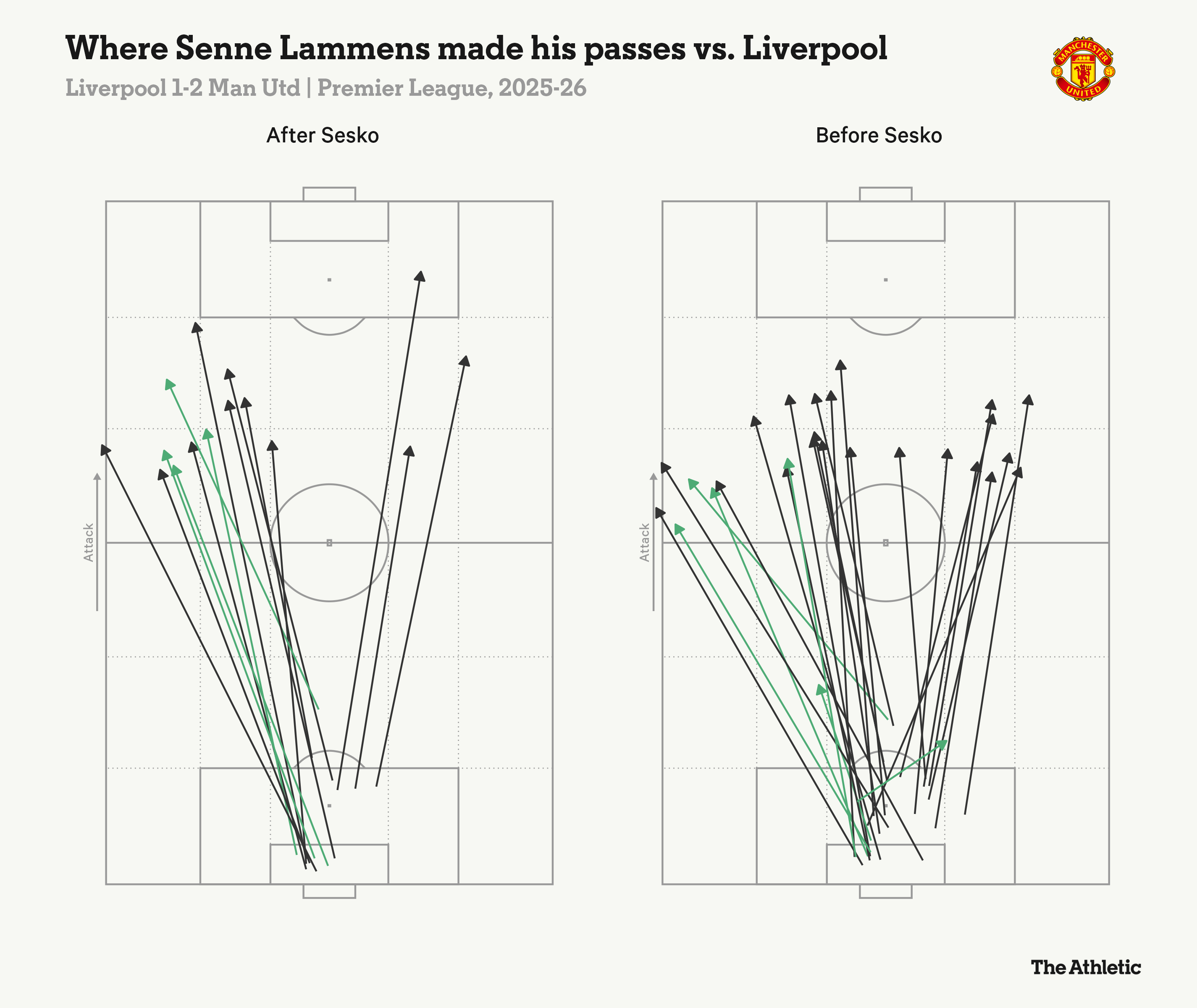
United’s first goal owed a debt to a clash between Van Dijk and Alexis Mac Allister, with Liverpool unhappy that play wasn’t stopped for a head injury. Bruno Fernandes’ out ball to Amad at wing-back began a quick attack that put the away side 1-0 up after 65 seconds.
Amorim may have taken a page out of Glasner’s book for his victory. United defended in an aggressive middle block similar to Crystal Palace in September. The objection was to stay compact in central areas, as well as stifling any passes into Gravenberch, who is crucial to Liverpool’s early build-up.
Slot’s side are unlikely to remain beatable for much longer. Far too little has been written about Mac Allister’s hernia issue in the summer, and subsequent slow return to match sharpness. Still, certain teams are profiting from a particular game plan.
Cut off the supply to Gravenberch, play direct, and attack the spaces behind the full-backs, and you have a puncher’s chance of getting a result.
Carl Anka

